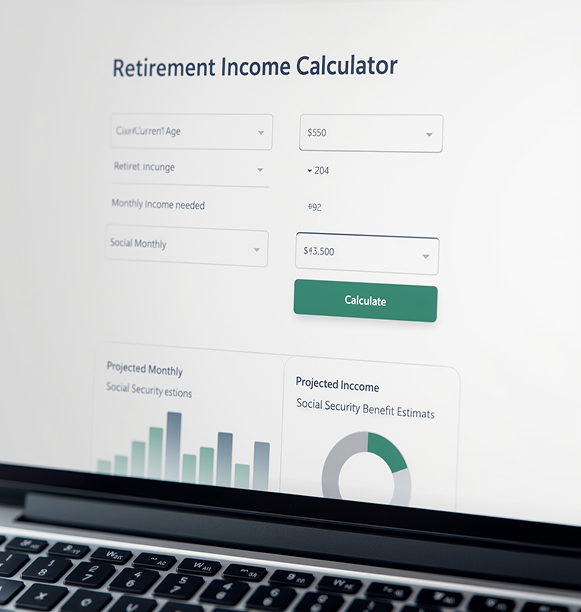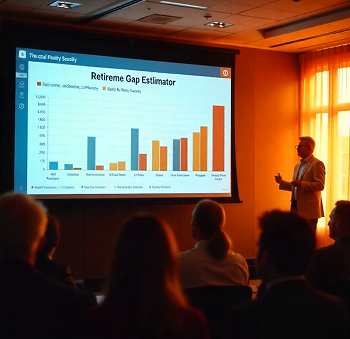Learn how Social Security works, when to apply, how to maximize your benefits, and what to do after a spouse passes — all in one easy-to-navigate website.
Understand the mechanics of Social Security in plain language
Avoid common filing mistakes
Get every dollar you deserve
Know your options and rights
Use our free income calculator
Talk to a specialist when you need more than articles


Use our free tool to see if your Social Security and other income sources will be enough to retire comfortably.
Try the Calculator20+ years of Social Security expertise
Plain-English education backed by real advisors
No government affiliation — just honest help
1-on-1 coaching available
Free tools and downloads — no obligation
7 Mistakes People Make When Filing for Social Security — and How to Avoid Them
Download NowYour benefit is based on
Your 35 highest-earning years
Your age when you file
A formula set by the Social Security Administration (not just what you paid in)
Even if you paid a lot into the system, Your benefit may not be proportionate unless your earnings were high and consistent for 35 years.


Even if you paid a lot into the system, Your benefit may not be proportionate unless your earnings were high and consistent for 35 years.
Born 1943–1954: FRA is 66
Born 1960 or later: FRA is 67
You can file earlier (as early as 62) or later (up to 70), but this will reduce or increase your monthly benefit accordingly.
Based on your earnings record
For spouses or ex-spouses of eligible workers
For widows, widowers, and dependents
If you become severely disabled before retirement age
For children of deceased or disabled workers
For children of deceased or disabled workers
You can start collecting benefits as early as age 62, but your monthly benefit will be permanently reduced typically by 25% to 30% compared to your Full Retirement Age (FRA).
You have health issues or a reduced life expectancy
You need income immediately
You’re no longer working and have limited savings
FRA is when you qualify for 100% of your Social Security benefit.
Born 1943–1954: FRA is 66
Born 1960 or later: FRA is 67
Your “break-even age” is the point where the total value of delayed benefits outweighs claiming early.
Example: If you wait until 70 vs. 62, you may receive fewer payments, but at a much higher monthly amount.


We recommend applying 3 months before you want your benefits to start.
Online at SSA.gov
By phone or in person at a local Social Security office
Talk to a Social Security Expert for a Personalized Strategy.
You should apply about 3 months before you want your benefits to start. This gives the Social Security Administration (SSA) enough time to process your application
Social Security number
Birth certificate (original or certified copy)
Proof of U.S. citizenship or lawful status (if not born in the U.S.)
Marriage and/or divorce dates (if claiming spousal benefits)
Bank account details for direct deposit
You’ll receive a confirmation letter within 10–14 days
Your first payment usually arrives the month after your benefits start
You’ll receive monthly payments via direct deposit or debit card
Applying too early without understanding the impact on lifetime benefits
Forgetting to report continued work or income
Using outdated forms or mailing delays
Not coordinating with your spouse if married
Pro Tip: Double-check everything before submitting to avoid processing delays.
For every year you delay taking benefits past your Full Retirement Age (FRA), your monthly check increases by about 8%, up until age 70.
Social Security uses your 35 highest-earning years to calculate your benefit. If you worked fewer than 35 years, zero-income years are factored in — which reduces your average
Married couples can use advanced strategies such as:
Reminder:
A surviving spouse inherits the larger of the two benefits, so maximizing one partner’s check can benefit both of you.If you’re under your FRA and still working while collecting benefits, you could be penalized:
Plan your income to avoid unintended reductions
Your Social Security may be taxable depending on your total income:
Consider tax-efficient withdrawals from retirement accounts to reduce your taxable income.

A timely and essential guide to what’s changing with Social Security in the upcoming year. Know the rules, benefit adjustments, and new planning opportunities.

This guide explores how to protect your retirement income from inflation, taxes, rising expenses, poor planning including how Social Security fits into your long-term strategy.

Are you ready to file? Use this checklist to make sure you have all the information and documents needed to apply the right way. Let’s get your application started today.

Use this spreadsheet to compare your expected retirement income from Social Security and other sources against your projected living expenses.

This side-by-side comparison explains how your monthly benefit changes based on the age you start collecting including a simplified break-even analysis.

Confused about what you can claim as a spouse or widow/widower? This guide breaks it down in plain language, simplifying the rules and helping you understand your options.
Use our free retirement income calculator to estimate how well your Social Security and other income sources will support your retirement lifestyle.

Zone
You’re on track
Zone
Spend less or Save more
Zone
Plan strategically
Our Social Security and retirement planning coach can walk you through your numbers, identify potential gaps, and suggest next steps to help secure your future
Launch the Retirement CalculatorSocial Security is full of rules, exceptions, and strategies most people never hear about. An expert can:
You don’t need to guess — you need a plan.
When you book a consultation, you receive:
We also offer customized reports you can share with your financial planner or tax advisor.
You’ll benefit from expert guidance if:
Click the button below
Choose your date and time
Complete a short intake form
Meet with your expert
Whether you’re just getting started or need personalized advice, reach out today and get the clarity you need.
Please fill out the form below and we’ll respond within 1 business day.
Social Security Simplified
It depends on your goals. You can start as early as age 62, but you’ll get a reduced benefit. Waiting until your full retirement age (66–67) or even 70 will increase your monthly check. The right time depends on your health, life expectancy, and income needs.
You can check your estimated benefits by creating a “my Social Security” account at SSA.gov.
Yes, depending on your total income. Up to 85% of your benefits could be taxable.
Yes, but if you’re under your full retirement age (FRA), your benefits could be reduced depending on how much you earn.
Yes, if your marriage lasted at least 10 years and you meet other requirements.
Survivor benefits may be available to your spouse or dependents based on your earnings record.
Yes, you have one opportunity to withdraw your application and reapply later. This must be done within 12 months and you’ll need to repay the benefits received.
You can apply online at SSA.gov, by phone, or by visiting your local Social Security office.
Spousal benefits are based on your living spouse’s record. Survivor benefits apply after the death of a spouse and can be higher.
Work with a Social Security expert to develop a personalized strategy based on your goals and situation.